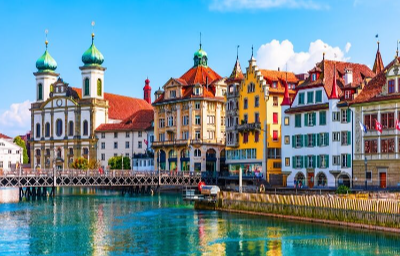Life About Moving to Switzerland: All Information on Moving to Switzerland

Expats in Switzerland find themselves in a country synonymous with natural beauty, high living standards, and economic stability, making it a dream destination for many. Moving to Switzerland involves a well-thought-out process, requiring thorough preparation and understanding of various aspects of Swiss life. This comprehensive guide offers all the information on moving to Switzerland, ensuring a smooth transition to your new home.
Understanding Switzerland
Switzerland is a small, landlocked country located in the heart of Europe, bordered by Germany, France, Italy, Austria, and Liechtenstein. Known for its neutrality, financial stability, and cultural diversity, Switzerland is divided into 26 cantons, each with its own constitution and significant autonomy. The country has four official languages: German, French, Italian, and Romansh, reflecting its rich multicultural heritage. Important cities like Zurich, Geneva, Basel, and Bern offer a cosmopolitan lifestyle, while the countryside showcases breathtaking landscapes.
Read more Registering Your Company & Why It Makes Perfect Business Sense To Do It In 2024.
Visa and Residency Requirements
Before you can move to Switzerland, it’s crucial to understand the visa and residency requirements, which depend on your nationality and purpose of stay. Citizens of European Union (EU) and European Free Trade Association (EFTA) countries have more flexibility and can enter Switzerland without a visa but must register with local authorities if staying longer than three months. Non-EU/EFTA citizens generally need a visa and must meet specific criteria to obtain a residence permit.
Types of Residence Permits
- Permit B (Initial Residence Permit): Typically granted for one year and renewable, this permit is issued to those with a work contract, self-employed individuals, or those joining a family member.
- Permit C (Permanent Residence Permit): After residing in Switzerland for 5-10 years, depending on nationality, individuals can apply for a Permit C, granting permanent residency.
- Permit L (Short-term Residence Permit): For short-term employment or study, this permit is usually valid for up to one year.
- Permit G (Cross-border Commuter Permit): Issued to individuals living in a neighboring country but working in Switzerland.
Finding Accommodation
Finding accommodation in Switzerland can be challenging due to high demand and relatively high prices, especially in urban areas. It’s advisable to start your search well in advance. Websites like Homegate, Comparis, and ImmoScout24 are popular platforms for finding rental properties. Consider both furnished and unfurnished options, and be prepared to provide references, proof of income, and a deposit, typically equivalent to one to three months’ rent.
Employment and Work Culture
Switzerland boasts a robust economy with low unemployment rates and competitive salaries. The country is home to numerous multinational corporations, especially in the finance, pharmaceutical, and technology sectors. Swiss work culture values punctuality, efficiency, and professionalism. Networking is essential, and proficiency in one of the national languages can be a significant advantage, although many companies operate in English.
Healthcare System
Switzerland has an excellent healthcare system, consistently ranked among the best globally. Health insurance is mandatory for all residents, and you must obtain coverage within three months of your arrival. The healthcare system operates on a private model, meaning you will need to choose from various insurance providers. It’s advisable to compare different plans to find one that suits your needs and budget.
Education
The Swiss education system is highly regarded and offers various options, including public, private, and international schools. Public schools are free and provide high-quality education, but instruction is typically in one of the national languages. International schools, which offer curricula in English and other languages, can be a good option for expatriates but often come with higher tuition fees. Higher education in Switzerland is also renowned, with institutions like ETH Zurich and the University of Zurich ranking among the best globally.
Cost of Living
Switzerland is known for its high cost of living, but this is balanced by high salaries and an excellent quality of life. Major expenses include housing, healthcare, transportation, and groceries. Dining out and entertainment can be costly, but there are also many accessible or affordable recreational activities, such as hiking and exploring the beautiful natural landscapes.
Banking and Finance
Opening a bank account in Switzerland is straightforward and can be done at most major banks like UBS, Credit Suisse, and PostFinance. You will need to provide identification, proof of address, and possibly a residence permit. Switzerland’s banking system is robust, offering various services to meet both personal and professional needs.
Cultural Integration
Switzerland is a multicultural country, and integrating into Swiss society can be a rewarding experience. Learning one of the national languages can significantly enhance your social and professional life. Participating in local events, joining clubs, and respecting Swiss customs and traditions will help you build connections and feel more at home.
Transportation
Switzerland has an efficient and reliable public transportation system, including trains, trams, buses, and boats. The Swiss Travel Pass offers unlimited travel on the network and is a convenient option for newcomers. Owning a car is also feasible, but remember that Switzerland has strict traffic regulations, and parking can be expensive in urban areas.
Conclusion
Moving to Switzerland is an exciting opportunity that requires careful planning and consideration. Understanding the visa and residency requirements, finding suitable accommodation, securing employment, and integrating into the local culture are essential steps to ensure a smooth transition. With its stunning landscapes, high quality of life, and economic stability, Switzerland offers a welcoming environment for newcomers. By preparing thoroughly and embracing the Swiss way of life, you can make the most of your new adventure in this beautiful country.





